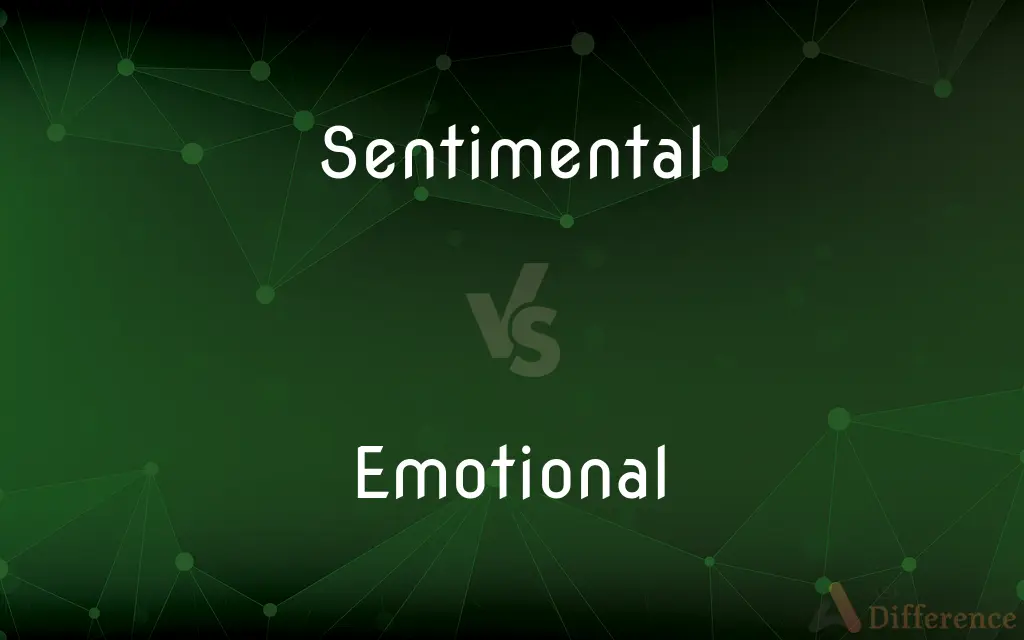Sentimental vs. Emotional — What's the Difference?
Edited by Tayyaba Rehman — By Maham Liaqat — Updated on April 1, 2024
Sentimental refers to feelings of tenderness, sadness, or nostalgia, often linked to memories or associations, while emotional denotes a broader range of feelings, including anger, joy, and fear.

Difference Between Sentimental and Emotional
Table of Contents
ADVERTISEMENT
Key Differences
Sentimental describes a specific type of emotional response that is deeply tied to feelings of nostalgia, tenderness, or sadness, often triggered by memories or particular objects. These feelings emphasize a longing for the past or an attachment to certain memories. On the other hand, emotional is a broader term that encompasses all types of feelings and emotions a person can experience, including but not limited to happiness, anger, fear, and surprise.
People often describe themselves or others as sentimental when they are easily moved by emotions, especially those that relate to personal history or attachments. For example, keeping old letters or photographs can be seen as sentimental actions because they preserve memories. Whereas, being emotional can refer to someone's immediate response to various situations, reflecting a wide spectrum of feelings, from crying at a sad movie to feeling elated at a friend’s success.
Sentimentality is sometimes viewed as overly emotional or excessively tender, potentially leading to a negative perception where individuals are seen as being unable to detach from the past. In contrast, being emotional is generally accepted as a natural part of human experience, acknowledging that people react in diverse ways to different stimuli, without the negative connotation of being stuck in the past.
The sentimental value of an object or a moment is derived from the personal connections and memories it evokes, not necessarily from its monetary worth. This contrasts with emotional reactions, which are immediate and can be triggered by a wide array of events, not just by nostalgia or memories.
While sentimental feelings are often associated with positive memories or objects that bring comfort, emotional responses can be positive or negative, influenced by current events, people's actions, or sensory inputs. This difference highlights the nuanced ways in which humans interact with their internal and external worlds.
ADVERTISEMENT
Comparison Chart
Definition
Related to feelings of nostalgia, tenderness, or sadness
Pertains to a broad range of human feelings and emotions
Trigger
Often linked to memories, nostalgia, or personal associations
Can be triggered by a wide variety of external and internal stimuli
Perception
Sometimes viewed negatively as overly nostalgic or tender
Generally accepted as part of the human experience
Associated Feelings
Nostalgia, tenderness, sadness
Happiness, anger, fear, surprise, etc.
Context
Often related to personal history or objects with emotional value
Relates to immediate responses to situations or stimuli
Compare with Definitions
Sentimental
Emphasizing emotional attachment over practicality.
Keeping his grandfather's watch was a sentimental choice, not about its value.
Emotional
Reacting strongly to stimuli or events.
She was very emotional after hearing the good news.
Sentimental
Having feelings of nostalgia or tenderness, often related to the past.
She felt sentimental looking through her childhood photos.
Emotional
Pertaining to any feelings or emotions a person experiences.
The emotional speech moved the audience to tears.
Sentimental
Relating to emotions that evoke a longing for the past.
The antique shop had a sentimental atmosphere, filled with stories of yesteryears.
Emotional
Involving complex feelings beyond logic.
His decision to help was driven by an emotional impulse.
Sentimental
Prone to emotional reactions based on memories.
The song had a sentimental value for him, reminding him of his college days.
Emotional
Covering a spectrum of feelings from joy to sadness.
The festival was an emotional rollercoaster, filled with highs and lows.
Sentimental
Showing excessive sensitivity to emotional matters.
The sentimental movie made everyone in the room cry.
Emotional
Expressing feelings openly and intensely.
The reunion was an emotional moment for everyone involved.
Sentimental
Having, showing, or caused by emotion, especially tender or affectionate feeling
I have sentimental ties to the small town I grew up in.
Emotional
Of or relating to emotion
An emotional illness.
Emotional crises.
Sentimental
Having, showing, or caused by strong or extravagant tenderness or sadness, often in an idealized way
"He had no sentimental illusions about poverty's virtues" (Sherill Tippins).
Emotional
Readily affected with or stirred by emotion
An emotional person who often weeps.
Sentimental
Characterized by sentiment, sentimentality or excess emotion.
Emotional
Arousing or intended to arouse the emotions
An emotional appeal.
Sentimental
Derived from emotion rather than reason; of or caused by sentiment.
Emotional
Marked by or exhibiting emotion
An emotional farewell.
Sentimental
Romantic.
Emotional
Of or relating to the emotions.
Emotional crisis
Emotional lift
Sentimental
Having, expressing, or containing a sentiment or sentiments; abounding with moral reflections; containing a moral reflection; didactic.
Nay, ev'n each moral sentimental stroke,Where not the character, but poet, spoke,He lopped, as foreign to his chaste design,Nor spared a useless, though a golden line.
Emotional
Characterised by emotion.
Sentimental
Inclined to sentiment; having an excess of sentiment or sensibility; indulging the sensibilities for their own sake; artificially or affectedly tender; - often in a reproachful sense.
A sentimental mind is rather prone to overwrought feeling and exaggerated tenderness.
Emotional
Determined by emotion rather than reason.
Emotional decision
Sentimental
Addressed or pleasing to the emotions only, usually to the weaker and the unregulated emotions.
Emotional
Appealing to or arousing emotion.
Emotional speech
Sentimental
Given to or marked by sentiment or sentimentality
Emotional
Easily affected by emotion.
She’s an emotional person.
Sentimental
Effusively or insincerely emotional;
A bathetic novel
Maudlin expressons of sympathy
Mushy effusiveness
A schmaltzy song
Sentimental soap operas
Slushy poetry
Emotional
Readily displaying emotion.
Emotional greeting
Emotional
An emotional person
Emotional
Pertaining to, or characterized by, emotion; excitable; easily moved; sensational; as, an emotional nature.
Emotional
Determined or actuated by emotion rather than reason;
It was an emotional judgment
Emotional
Of more than usual emotion;
His behavior was highly emotional
Emotional
Of or pertaining to emotion;
Emotional health
An emotional crisis
Emotional
Extravagantly demonstrative;
Insincere and effusive demonstrations of sentimental friendship
A large gushing female
Write unrestrained and gushy poetry
Emotional
Of persons; excessively affected by emotion;
He would become emotional over nothing at all
She was worked up about all the noise
Common Curiosities
Is being sentimental considered a weakness?
While some may view sentimentality as a form of emotional vulnerability, it is a natural human trait that connects people to their past and memories.
How does sentimentality affect perception?
Sentimentality can color one's perception with a longing for the past, sometimes making it hard to let go of old memories or objects.
What's the difference between sentimental and emotional value?
Sentimental value is derived from personal memories and nostalgia, whereas emotional value encompasses the broader emotional significance of an object or event.
Can a person be both sentimental and emotional?
Yes, a person can be both sentimental in specific contexts related to nostalgia and broadly emotional in their responses to various situations.
Can emotions be controlled?
While it's difficult to control what we feel, people can learn to manage how they respond to their emotions through various strategies.
What is an example of an emotional response?
Feeling joy at a friend’s achievement or sadness during a heartbreaking movie scene are examples of emotional responses.
What makes someone sentimental?
Being sentimental involves a deep emotional response to nostalgia, memories, or objects that evoke a sense of the past.
How do emotions impact decision-making?
Emotions can greatly influence decision-making, sometimes leading to choices based on feelings rather than rational analysis.
Do sentimental feelings always relate to good memories?
Not necessarily; sentimental feelings can also be associated with sad or bittersweet memories, as long as they evoke a deep emotional response.
What role does empathy play in emotional responses?
Empathy allows individuals to understand and share the feelings of others, often leading to more nuanced and compassionate emotional responses.
Why do some people cry easily at sentimental moments?
Individuals who are more in tune with their emotions or have strong connections to memories may cry easily when those memories are triggered.
How do culture and upbringing affect sentimentality?
Cultural background and upbringing can significantly influence what individuals find sentimental, as these factors shape personal values and experiences.
Is it possible to become less sentimental?
Yes, through mindfulness and focusing on the present, individuals can learn to appreciate memories without being overly attached to them.
What triggers an emotional reaction?
Emotional reactions can be triggered by a variety of stimuli, including interpersonal interactions, life changes, or even art and music.
Can objects be emotional?
While objects themselves cannot feel emotions, they can evoke strong emotional responses in people based on memories or associations.
Share Your Discovery

Previous Comparison
Away vs. Way
Next Comparison
Vengeful vs. VindictiveAuthor Spotlight
Written by
Maham LiaqatEdited by
Tayyaba RehmanTayyaba Rehman is a distinguished writer, currently serving as a primary contributor to askdifference.com. As a researcher in semantics and etymology, Tayyaba's passion for the complexity of languages and their distinctions has found a perfect home on the platform. Tayyaba delves into the intricacies of language, distinguishing between commonly confused words and phrases, thereby providing clarity for readers worldwide.














































